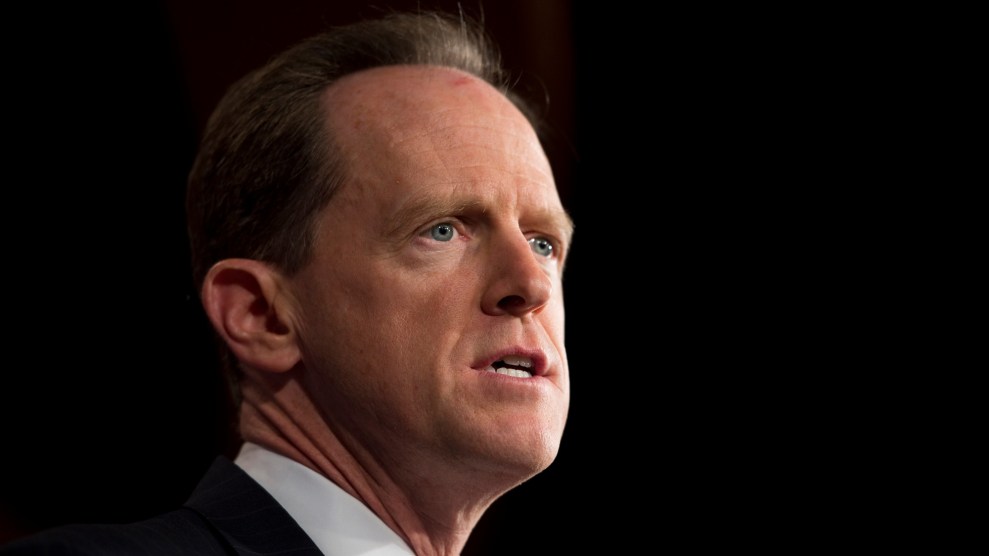
Bill Clark/CQ Roll Call/AP
One of my favorite recent documents in American politics is Evan Bayh’s schedules from his last year in office as a Democratic senator from Indiana. In the months following his 2010 announcement that he would retire rather than seek re-election, the Associated Press reported, the man who was almost Barack Obama’s running mate “held more than four dozen meetings and phone calls with head hunters and future corporate employers.”
That summer, Bayh cast a key vote to help save the carried interest loophole, the tax break that allows private equity managers to pay a considerably lower rate on much of their income by treating it like capital gains rather than compensation. That fall, Bayh embarked on a whirlwind tour of the private equity world. In the span of just a few days in September, the AP reported, he spent the night at a Nantucket estate belonging to the co-chair of the PE giant the Carlyle Group, then flew to New York, where he stayed at an apartment belonging to an executive at the PE giant Apollo Global Management; took meetings with executives at Credit Suisse and Deutsche Bank; had dinner with the CEO of Goldman Sachs; and—this is my favorite part—sat for an interview with Katie Couric on the subject of “why are our politics so broken.”
Bayh’s hustle eventually paid off. Shortly after his term in office had ended, he took a new job as a senior adviser at Apollo, the company whose now-disgraced former CEO, Leon Black, he’d met with twice.
As my colleague Hannah Levintova explained last year, private equity firms pool money from big investors like pension funds and college endowments and use that cash to take over actual companies—chain retailers, dentist offices, you name it. It’s a $7.3 trillion industry that touches basically everything in your life, and it’s growth has had serious consequences for workers, patients, and consumers. It’s also become a premier destination for retired public servants. Connecticut Sen. Joe Lieberman, who joined Bayh in voting to save the carried interest loophole, ended up at a PE firm. Timothy Geithner and Steve Mnuchin—who served as treasury secretaries in the Obama and Trump administrations—both entered the PE space after their respective bosses failed to fulfill their campaign promises to close the loophole. And on Wednesday, the industry welcomed the newest politico to pass through its revolving door: Former Pennsylvania Republican Sen. Pat Toomey is joining the board of Apollo—just a few years after playing his own key part in preserving the loophole.
As I wrote in a story for the magazine last year, the loophole is one of Washington’s favorite punching bags and also one of its most unsinkable provisions. It has survived repeated legislative battles over the last decade-and-a-half, through three presidential administrations. The private-equity industry has a lot of people to thank for the tax break’s continued existence. Sen. Chuck Schumer (D-N.Y.) did his part to tank the repeal effort in 2007. Bayh helped block it in 2010. Arizona Sen. Kyrsten Sinema (I–Ariz.) helped scuttle the movement just last year.
Toomey’s turn came in the first two years of the Trump administration, when the new president—who had said fund managers were “getting away with murder” and promised to eliminate the carried interest break—began his push for a sweeping new tax reform law. As a member of both the budget and finance committees, Toomey was instrumental in shaping it. The Washington Post reported that he worked tirelessly to craft the legislation into what it ultimately became—a corporate-friendly grab-bag that disproportionately favored America’s richest citizens. And he stuck his neck out for carried interest loophole. Toomey was an “all star” in the fight, a lobbyist told Bloomberg. The final law made a mostly cosmetic change to carried interest that had little effect on private equity’s bottom line.
Toomey, to be clear, is as much of a true-believer as they come in conservative politics—not in the cultish Trump-era way (he voted to convict the president in his second impeachment trial, after January 6th), but in his devotion to supply-side economics. This is less about any sort of quid pro quo than it is a kind of ideological gravity. He worked on Wall Street before his career in politics, and he ran the Club for Growth before running for Senate. In taking a job with Apollo, Toomey is returning to this world. But given his legacy on Capitol Hill, you might also say he never really left it.

















